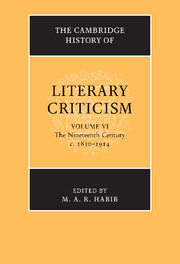Book contents
- The Cambridge History of Literary Criticism
- Series page
- The Cambridge History of Literary Criticism
- Copyright page
- Contents
- Notes on contributors
- Acknowledgements
- Introduction
- I Literary criticism as an institution
- 1 Contexts and conditions of criticism 1830–1914
- 2 Literary studies and the academy
- 3 Women and literary criticism
- II National developments in literary criticism
- III Critical movements and patterns of influence
- IV Later nineteenth-century developments: Realism, Naturalism, Symbolism and Decadence
- V Some major critics of the period
- VI Genre criticism
- VII Literature and other disciplines
- Select bibliography and further reading
- Index
1 - Contexts and conditions of criticism 1830–1914
from I - Literary criticism as an institution
Published online by Cambridge University Press: 05 February 2013
- The Cambridge History of Literary Criticism
- Series page
- The Cambridge History of Literary Criticism
- Copyright page
- Contents
- Notes on contributors
- Acknowledgements
- Introduction
- I Literary criticism as an institution
- 1 Contexts and conditions of criticism 1830–1914
- 2 Literary studies and the academy
- 3 Women and literary criticism
- II National developments in literary criticism
- III Critical movements and patterns of influence
- IV Later nineteenth-century developments: Realism, Naturalism, Symbolism and Decadence
- V Some major critics of the period
- VI Genre criticism
- VII Literature and other disciplines
- Select bibliography and further reading
- Index
Summary
- Type
- Chapter
- Information
- The Cambridge History of Literary Criticism , pp. 21 - 45Publisher: Cambridge University PressPrint publication year: 2013
- 3
- Cited by

